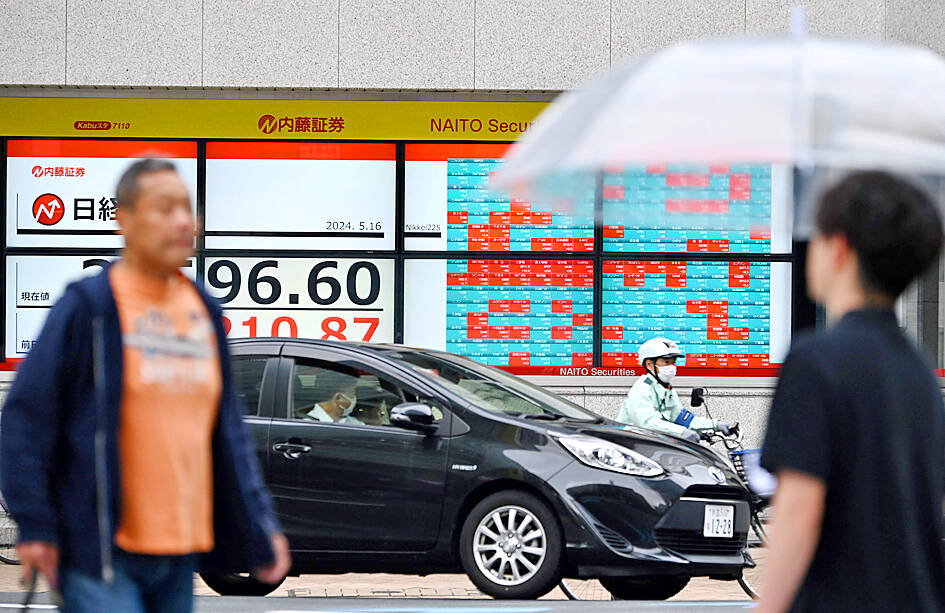The Japanese economy shrank at an annual rate of 2 percent in the first quarter of this year, as consumption and exports declined, Japan’s government said on Thursday.
Although unemployment has stayed relatively low in the world’s fourth-largest economy at about 2.6 percent, wage growth has been slow and prices have risen partly due to weakness of the yen against the US dollar.
Quarter-to-quarter, the preliminary seasonally adjusted GDP slipped 0.5 percent in the January-to-March period, Japan’s Cabinet Office said.

Photo by: Kazuhiro Nogi, AFP
The yen has been trading at three-decade lows recently, with the US dollar costing about ¥155.
That has helped tourism, but hurts spending power, especially for a nation that imports almost all its energy.
The results were generally worse than what analysts had forecast.
Sluggish consumer spending is a big problem since private consumption accounts for half of Japanese economic activity.
Also denting growth were the problems at carmaker Toyota Motor Corp’s subsidiary, although production is now back up.
Earlier this year, the Japanese government ordered Daihatsu Motor Co to halt production of its entire lineup, because of faked safety test results.
The disruptions of car production and sales due to the safety scandal brought down overall growth, but that means they would likely bounce back later in the year, ING Groep NV chief Asia Pacific economist Rob Carnell said.
“Monthly activity data already shows a gradual normalization since March,” Carnell said.
The latest data would be a challenge for Japan’s central bank on when to further raise interest rates, an action that is expected to come sooner or later, possibly in July.
Policymakers are likely to proceed with more caution in a weak economy.
The Bank of Japan raised interest rates earlier this year for the first time since 2007, but only to a range of zero to 0.1 percent from minus-0.1 percent.

When an apartment comes up for rent in Germany’s big cities, hundreds of prospective tenants often queue down the street to view it, but the acute shortage of affordable housing is getting scant attention ahead of today’s snap general election. “Housing is one of the main problems for people, but nobody talks about it, nobody takes it seriously,” said Andreas Ibel, president of Build Europe, an association representing housing developers. Migration and the sluggish economy top the list of voters’ concerns, but analysts say housing policy fails to break through as returns on investment take time to register, making the

‘SILVER LINING’: Although the news caused TSMC to fall on the local market, an analyst said that as tariffs are not set to go into effect until April, there is still time for negotiations US President Donald Trump on Tuesday said that he would likely impose tariffs on semiconductor, automobile and pharmaceutical imports of about 25 percent, with an announcement coming as soon as April 2 in a move that would represent a dramatic widening of the US leader’s trade war. “I probably will tell you that on April 2, but it’ll be in the neighborhood of 25 percent,” Trump told reporters at his Mar-a-Lago club when asked about his plan for auto tariffs. Asked about similar levies on pharmaceutical drugs and semiconductors, the president said that “it’ll be 25 percent and higher, and it’ll

NOT TO WORRY: Some people are concerned funds might continue moving out of the country, but the central bank said financial account outflows are not unusual in Taiwan Taiwan’s outbound investments hit a new high last year due to investments made by contract chipmaker Taiwan Semiconductor Manufacturing Co (TSMC, 台積電) and other major manufacturers to boost global expansion, the central bank said on Thursday. The net increase in outbound investments last year reached a record US$21.05 billion, while the net increase in outbound investments by Taiwanese residents reached a record US$31.98 billion, central bank data showed. Chen Fei-wen (陳斐紋), deputy director of the central bank’s Department of Economic Research, said the increase was largely due to TSMC’s efforts to expand production in the US and Japan. Investments by Vanguard International

WARNING SHOT: The US president has threatened to impose 25 percent tariffs on all imported vehicles, and similar or higher duties on pharmaceuticals and semiconductors US President Donald Trump on Wednesday suggested that a trade deal with China was “possible” — a key target in the US leader’s tariffs policy. The US in 2020 had already agreed to “a great trade deal with China” and a new deal was “possible,” Trump said. Trump said he expected Chinese President Xi Jinping (習近平) to visit the US, without giving a timeline for his trip. Trump also said that he was talking to China about TikTok, as the US seeks to broker a sale of the popular app owned by Chinese firm ByteDance Ltd (字節跳動). Trump last week said that he had